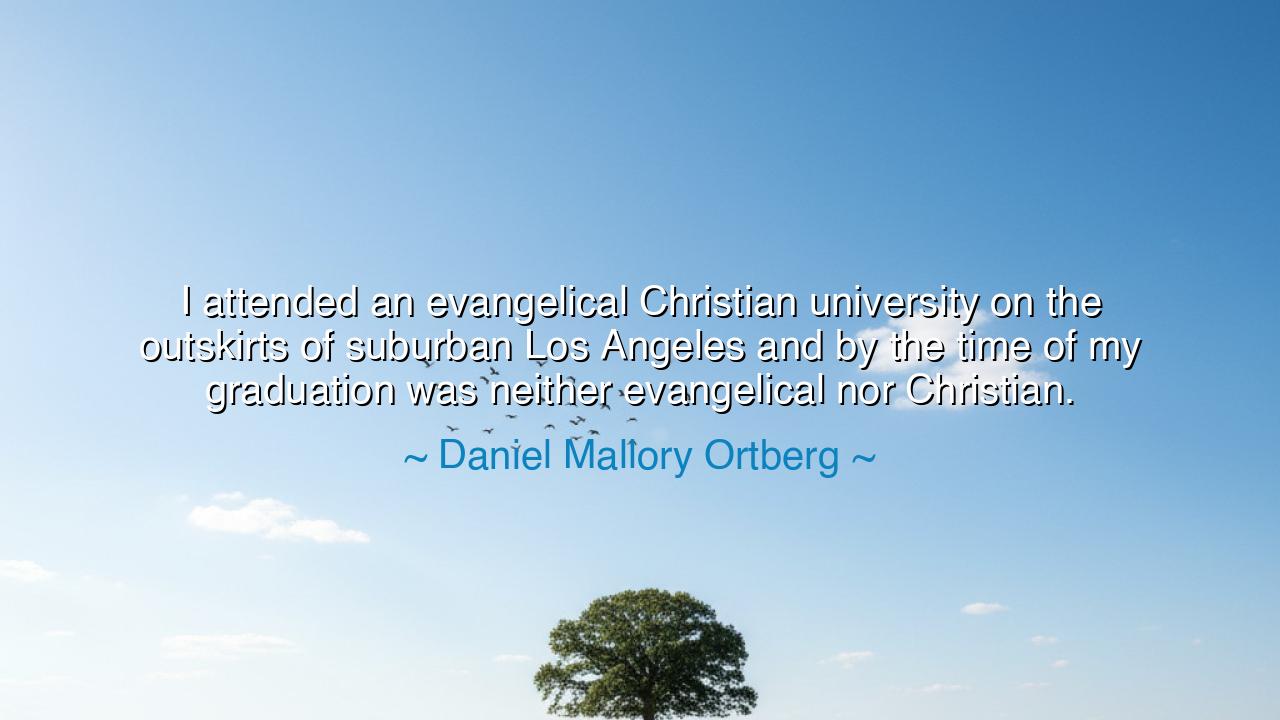
I attended an evangelical Christian university on the outskirts
I attended an evangelical Christian university on the outskirts of suburban Los Angeles and by the time of my graduation was neither evangelical nor Christian.






In the hauntingly honest words, “I attended an evangelical Christian university on the outskirts of suburban Los Angeles and by the time of my graduation was neither evangelical nor Christian,” Daniel Mallory Ortberg speaks of a journey as old as faith itself — the pilgrimage from belief to doubt, from certainty to questioning, from the embrace of the familiar to the wilderness of the self. Beneath this simple confession lies a profound story of transformation, of a soul that dared to step beyond the walls of inherited truth to seek a truth of its own making. It is not a tale of rebellion, but of awakening — a metamorphosis wrought not in anger, but in the quiet, painful unfolding of realization.
Ortberg’s life and writing often weave together the sacred and the irreverent, the holy and the human. Born into a deeply religious environment, they grew up immersed in the rhythms of Christian theology and evangelical culture, a world of sermons, rituals, and divine expectations. To attend an evangelical university, then, was not merely a choice of education; it was a continuation of that sacred inheritance — a world that promised clarity, belonging, and spiritual order. But like many who walk into institutions built upon certainty, Ortberg emerged not comforted, but transformed by doubt. In those years of study, what began as faith hardened by doctrine was dissolved by experience, by encounter, by the living complexity of human truth.
The origin of this quote lies in the paradox of learning: that true education does not always affirm what we believe, but often dismantles it. For Ortberg, immersion in theology, philosophy, and the study of scripture led not to deeper conformity, but to the painful revelation that belief cannot survive as inheritance alone. To question the framework of faith is not an act of betrayal, but of courage — the same courage that Socrates showed when he said, “The unexamined life is not worth living.” For Ortberg, to think deeply was to risk everything they had once held sacred — and yet, that very risk became the seed of authenticity.
The ancients knew this journey well. Consider the story of Buddha, who left the palaces of comfort and doctrine to walk among the sick, the old, and the dying. His awakening was not born of rejection, but of compassion — a realization that the teachings he had known could not contain the vastness of human suffering. Like Ortberg, he stepped beyond the bounds of what he was told to believe, and in doing so, he found a deeper, freer form of truth. Both stories teach the same lesson: that the path to enlightenment often begins with the death of certainty.
Ortberg’s transformation also speaks to the loneliness of spiritual rebirth. To cease to be “evangelical or Christian” in a community built upon shared belief is to walk into exile. It is to feel the silence of those who once called you kin, to bear the ache of being misunderstood. Yet exile, in the language of the ancients, is not the end — it is the wilderness before revelation. For Moses, it was in the desert that he met the burning bush. For Ortberg, the desert was intellectual and spiritual — the long solitude of questioning everything, yet still hungering for meaning. And from that solitude emerged not despair, but wisdom — the courage to speak of faith’s unraveling with tenderness and grace.
The meaning of Ortberg’s reflection reaches beyond religion; it is the story of every human being who outgrows the walls built for them by others. Whether those walls are made of faith, tradition, or expectation, there comes a moment when the soul must walk beyond them — not because it despises what is behind, but because it must continue becoming. The graduation in this quote is both literal and symbolic — a crossing over not just from student to adult, but from disciple to seeker. It is the moment when the soul says, “I will no longer inherit truth; I will live it.”
The lesson, therefore, is not to fear transformation. To lose one’s former faith — whether religious, ideological, or personal — is not to lose oneself, but to find oneself anew. Faith, if it is to live, must evolve. Certainty may comfort, but it cannot awaken. Ortberg’s journey reminds us that to walk away from old beliefs is not to fall into emptiness, but to step into the open — where truth is not prescribed, but discovered, moment by moment, through compassion, humility, and courage.
And the practical action for the listener is this: when your beliefs no longer fit the shape of your soul, do not cling to them out of fear. Let them fall away as autumn leaves fall from the tree — not as death, but as renewal. Seek teachers, but also question them. Pray, but also listen to silence. Trust that the divine, if it exists, is not threatened by your honesty. For as Daniel Mallory Ortberg’s journey shows, sometimes the greatest act of faith is not believing harder — but daring to walk into doubt, and finding light waiting there.






AAdministratorAdministrator
Welcome, honored guests. Please leave a comment, we will respond soon